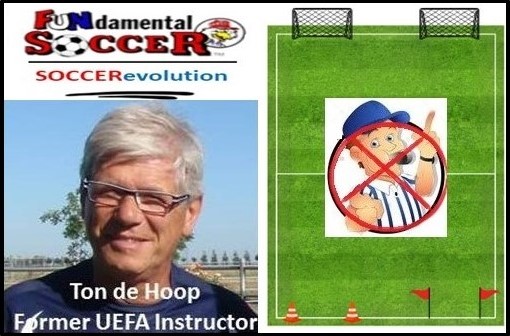After reading your latest Komments newsletter, I thought you might find my article helpful in the ongoing conversation about youth soccer development. I hope it supports your efforts to reduce the alarming dropout rate in the teen years while creating the ideal environment for players to Fall in Love with the Game for a Lifetime!

As a coach in Holland, I’ve seen the benefits of a bold move by the KNVB (Dutch Football Federation): allowing U8, U9, and U10 players to play without referees. This approach helps kids better understand the game, make their own decisions, and, most importantly, have more fun—creating a deeper love for the game!
When I heard about your SOCCERevolution in the U.S. promoting the same idea, I was 100% on board. I believe this model can have a huge impact on young players’ development in D-7 and the U.S.A., just as it has in the Netherlands.
Playing without referees should be the next big step, and here are the key takeaways …
____________________________________________________________________________
1. What is a Game Supervisor? 🏅
Instead of a referee enforcing rules, there is a Game Supervisor 🏅, typically the (assistant) coach of the home team, who:
- Walks along the sidelines and monitors the game.
- Intervenes minimally, allowing players to interpret and enforce the rules themselves.
- Whistles only when needed 🔔, pausing the game to explain calls or rules if players make an incorrect decision.
- Enters the field sparingly, only to clarify specific rules if necessary.
This role is less about enforcing rules and more about guiding young players to understand the game better, fostering self-regulation and decision-making skills.
2. Overcoming the Hesitation:
Why Parents and Coaches Might Be Unsure 🤔
For parents and coaches who have always seen referees as a fixture in soccer games, this concept may seem strange at first. But understanding the potential benefits ⚽ can make a big difference.
When we allow children to play without referees, the focus shifts from strict rule enforcement to developing players’ understanding and enjoyment of the game. The less structured atmosphere can help kids learn soccer in a natural and engaging way.
3. Key Benefits of Playing Without Referees 💡
Let’s explore why this approach has such a positive impact on young players’ development:
a) Fewer Interruptions, More Flow ⏩
With fewer calls interrupting the game, players can enjoy a smoother, more continuous experience. They learn to handle minor infractions themselves and play with a more organic rhythm, keeping the game fun and flowing.
b) Players Are in Charge of Their Game 🤝
Players learn to interpret and respect the rules When they make decisions on the field without immediate interference. They gain confidence in understanding the game and build sportsmanship skills as they work together to self-regulate.
c) More Fun and Enjoyment ❤️⚽
The lack of constant stoppages fosters an environment where the game becomes a natural learning experience. The players’ focus stays on playing and having fun rather than worrying about penalties or strict rule enforcement. This makes soccer a positive experience, helping to instill a lifelong love for the game.
4. Changing the Mindset:
How Coaches Can Support This Approach 🎓
For this shift to succeed, coaches must be on board and well-prepared to guide players through this new system. Here’s how we can make that happen:
Incorporating Training into Coaching Courses 🏫
In areas adopting this approach, it should be a core part of coach training for these age groups. The curriculum could include:
- Practice sessions without referees, where coaches practice observing without intervening unnecessarily.
- On-the-sideline scrimmages during training sessions, where coaches act as supervisors. They can stop the game when necessary, help players understand how to restart play, and encourage players to solve issues themselves.
Reinforcing Skills During Practice Scrimmages ⚽👥
To get players accustomed to playing without a referee, each training session should end with a short scrimmage where the coach acts as the game supervisor. The coach can guide players on handling fouls, rule restarts, and help them understand the reasoning behind calls. Over time, players become more skilled at reading and regulating the game themselves.
5. Pilot Program:
Testing the Waters in a Region 📍
Adopting this method could start with a pilot program in one region. Here’s a suggested approach:
- Regional Curriculum Update 📘: Adjust the curriculum for U8, U9, and U10 teams to remove referees from games and introduce game supervisors instead.
- Coach Training 🕒: Offer a short, 3-hour course to train coaches to act as game supervisors and integrate the concept into their practices.
- Cost Savings 💲: Removing referees from younger games also reduces the costs associated with game officiation, making soccer more accessible for families.
Final Thoughts:
A New Pathway to a Better Soccer Experience 🛤️
Playing without referees is an innovative approach that saves costs and enhances young players’ experience, understanding, and enjoyment of the game. This approach helps them grow as players, learn to respect each other, and gain confidence on the field.
If one region in the U.S. could lead the way, others might follow, impacting how we develop young soccer players nationwide. It’s an investment in more than just the game; it’s an investment in the future of sportsmanship and player development.
D-7 Give It a Shot – for the Love of The Game! ❤️⚽




